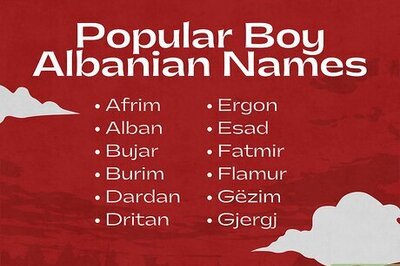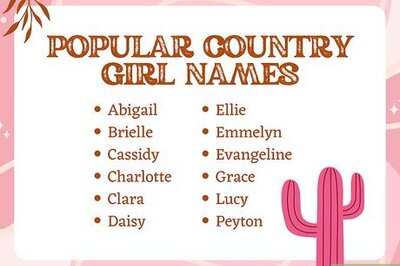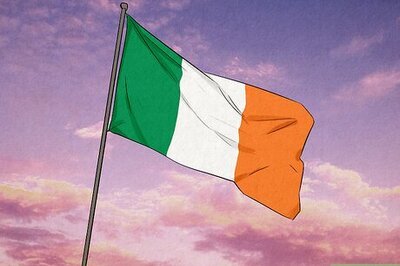
views
Los Angeles: Behind a pair of nondescript black doors on the second floor of an angular office building along an unremarkable stretch of Ventura Boulevard is the headquarters for Call of Duty: Modern Warfare developer Infinity Ward. It's out of sight from Hollywood in an unsuspectingly sterile place where one might expect to find spreadsheets, not video games.
Yet beyond these doors is where one of the gaming industry's most successful titles was created - and where its sequel nearly unraveled last year when Call of Duty publisher Activision Blizzard Inc. fired Infinity Ward executives Jason West and Vince Zampella, a shake-up that left shoot-'em-up fans wondering if there would even be a Modern Warfare 3.
Past the trophy case in the reception area, on the opposite side of the building from the cafeteria that's always stocked with energy drinks, is the corner conference room where the developers from Silicon Valley-based Sledgehammer Games would meet with the San Fernando Valley-based Infinity Ward staffers who didn't follow West and Zampella out the doors.
"It started with flying back and forth all the time," said Glen Schofield, general manager and co-founder at Sledgehammer Games. "Once we got to know each other really well, we did more videoconferencing. That was pretty much daily. We were in constant contact, reviewing each other's missions, playing multiplayer and collaborating together."
Undeterred by the behind-the-scenes drama, Activision replaced West and Zampella with Activision chief technology officer Steve Pearce and head of production Steve Ackrich, while the newly formed Sledgehammer Games switched from developing a brand-new Call of Duty game to formulating Modern Warfare 3 with the remaining Infinity Ward developers.
"There was no dividing it up," said Pearce. "That was a decision we made right from the get go. Everyone worked on all parts of the story. We really became one big virtual studio drawing on each other's strengths, bringing the lore and experience from this end (at Infinity Ward) and the unique input and creativity from the other end at Sledgehammer."
Together, they constructed the story of Call of Duty: Modern Warfare 3, which picks up almost immediately after the events of Modern Warfare 2 when Washington, DC, was under attack from Russian forces. In the third instalment, the conflict sparked by terrorist Vladimir Makarov has engulfed several other cities, including New York, Paris and London.
Schofield and his colleagues at Sledgehammer Games, who worked on the sci-fi horror title Dead Space, boldly accepted the challenge of tackling the industry's biggest franchise. They ditched work on their Call of Duty spin-off and focused on creating a completely new Modern Warfare game that was true to the series' previous two instalments.
"There was definitely a steep learning curve with this franchise," said Bret Robbins, creative designer at Sledgehammer Games. "There are a lot of unwritten rules about what makes these games great that we had to discover and then have them ingrained in us. It was challenging to think in a different way. It drives you forward once you learn it."
Robbins said he originally underestimated the importance of dialogue in the game, which is scheduled for release Tuesday. As players transverse the single-player campaign, voices from enemies and squadmates must not only create an immersive experience but also detail what's happening outside the player's view with the game's global conflict.
Robert Bowling, the creative strategist who has been at Infinity Ward since the first Modern Warfare, believes the series' casual fans probably don't know - or don't care - about the collaboration, but that die-hard players will be aware that Sledgehammer helped shape Modern Warfare 3. (Raven Software was also enlisted to work on the multiplayer mode.)
"I wanted to see us improve on what we had done in the past and go in a new direction," said Bowling. "It was actually really refreshing to have Sledgehammer come in early on because we had been making Call of Duty games for a long time. It kind of reminded me of the excitement of working on Call of Duty 4 when we set out to create a new game from scratch."
Under the command of West and Zampella, Infinity Ward reinvigorated Activision's ageing Call of Duty franchise in 2007 with Call of Duty 4: Modern Warfare, a first-person military shooter that swapped the series' authentic World War II recreations for fictional current-day conflicts. They followed it up in 2009 with Call of Duty: Modern Warfare 2.
When Modern Warfare 2 launched, the title broke entertainment industry records and went on to earn more than $1 billion in sales, paving the way for Santa Monica, California-based developer Treyarch's Call of Duty: Black Ops to sell more than 25 million copies in 2010. Modern Warfare 3 is expected to top that, despite the loss of West and Zampella.
"It's still kind of shocking to this day," said Zampella, who is embroiled in a lawsuit with West against Activision for $36 million in unpaid Modern Warfare royalties. "We did the most successful thing they've ever had, and for it to come to them firing us, it was inconceivable. I still don't fully understand it to this day. I guess we'll see how that goes."
Activision said West and Zampella breached their contracts by meeting with rival publisher Electronic Arts Inc. Their dismissal led to an exodus of staffers from Infinity Ward to Respawn Entertainment, a new studio founded by West and Zampella that will create games published by Electronic Arts. They're all scheduled to duke it out in court next May.
While the battle between Activision, West and Zampella is far from resolved, the developers at Sledgehammer and Infinity Ward affirm that the storylines from the previous Modern Warfare games will be wrapped up in the third. However, if Call of Duty fans have learned anything over the past eight years, it's that the doors are always open for more Call of Duty.




















Comments
0 comment